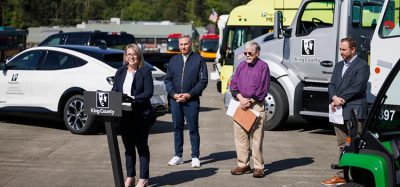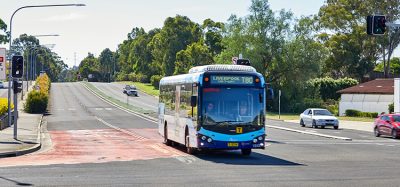Why COP26 is an unmissable opportunity for the transport industry
- Like
- Digg
- Del
- Tumblr
- VKontakte
- Buffer
- Love This
- Odnoklassniki
- Meneame
- Blogger
- Amazon
- Yahoo Mail
- Gmail
- AOL
- Newsvine
- HackerNews
- Evernote
- MySpace
- Mail.ru
- Viadeo
- Line
- Comments
- Yummly
- SMS
- Viber
- Telegram
- Subscribe
- Skype
- Facebook Messenger
- Kakao
- LiveJournal
- Yammer
- Edgar
- Fintel
- Mix
- Instapaper
- Copy Link
Posted: 8 February 2021 | Richard Dilks - CoMoUK | No comments yet
Richard Dilks of Collaborative Mobility UK explains why the COP26 in Glasgow is such an important opportunity for the transport industry to enact real change in the way we move.


The 2021 United Nations Climate Change Conference, also known as COP26, will be held in Glasgow
Later this year, the UK will host COP26 in Glasgow. This is the first time the UK has ever hosted the UN’s annual climate summit, and the first summit when many of the ‘by 2020’ elements of the landmark Paris agreement of 2015 can be judged.
It may be the most significant ever. Sustainable transport organisations see this Conference of the Parties (COP) as a key opportunity to galvanise efforts to achieve the UK’s legally binding goal of net zero greenhouse gas emissions by 2050 at the latest.
The transport sector’s emissions have actually increased in recent years; it is now the single largest emitting economic sector in our country. COP26 presents a chance to deepen the shift to sustainable transport.
There are other reasons to get excited which go well beyond the environmental agenda: to improve our air quality; to reduce inequalities and include more isolated communities in our transport gearchange; and to raise our activity levels and thereby our public health.
For change to truly stem from this summit, the positive differences that COP26 can make to people’s lives have to be at the fore. We cannot allow this opportunity to slip by without leaving an impression on the conscience of the UK public.
What needs to change?
We know that surface transport, primarily private car use, is a big part of the problem when it comes to emissions. While cars that are cleaner at the tailpipe or have no tailpipe emissions are certainly part of the answer, the data shows us that this will not be enough.
In fact, we need to start with measures to avoid journeys that can be avoided; then to focus on shifting necessary journeys to the most sustainable modes; and then to cleaning up motorised journeys. Crucial to doing this is making the alternatives to the private car more available and attractive as well as any reducing private car use.
Public, community, shared and active transport should be prioritised, celebrated and further developed. We already know from years of research that initiatives such as car clubs and bike share schemes get people moving more, using public transport more and cutting the private car out of their lives. We know that walking and cycling rates can be boosted when people are offered the routes that fit their needs. We know that before the pandemic, rail passenger journeys in the UK were double their 1995 level.
We need to build on that momentum, rather than the swing to motorised travel (largely away from public transport) that we have seen during the pandemic. The creation of mobility and community hubs in our towns and cities can take us further, allowing people to get to where they want to be in a way that incorporates shared, community and public transport with walking and cycling. These hubs are increasingly widespread in continental Europe and they are spreading in the United States.
Anyone who has increased their levels of cycling, walking or running – perhaps through lockdown – will tell you the huge impact it has made on their mental wellbeing. Cycling and walking both release our ‘feel-good’ hormones known as endorphins. These hormones help to relax your mind and make you feel happier. Exercise like cycling can lower the levels of your body’s stress hormone, cortisol.
In addition, reducing pollution isn’t just good for the respiratory system, it kicks into effect a behavioural change which benefits physical and mental health on a potentially enormous scale.
By offering low-cost transport options which people do not need to insure, maintain or store, shared transport also makes travel more accessible for those on lower incomes who often perhaps do not have convenient, affordable and low carbon options at present.
Uniting to make a real difference
While there has been so much to worry about in this past year, the health emergency could well trigger attitude changes which can lead to a better future, not least in terms of people’s links to their own community and how they feel about the physical world around them.
Ensuring these priorities make their way up the agenda will be one of the tasks of a newly-formed group – the Sustainable Transport Alliance. This comprises eight NGOs covering walking, cycling, shared, community and public transport: Community Rail Network; Campaign for Better Transport; Bus Users UK; Community Transport Association; Living Streets; Sustrans; London Cycling Campaign; and my organisation, Collaborative Mobility UK (CoMoUK).
We hope the formation of the group will help focus minds ahead of next November. The group’s priorities are, firstly, to get across how critical public, community, shared and active travel is to our recovery, and to show that these forms of transport are not just beneficial but aspirational too.
Secondly, to create opportunities for innovation and collaboration across transport and with governments at all levels, centred around communities’ needs.
Thirdly, the group wants to bring partners and evidence together to galvanise progress in the run up to COP26.
We have to start turning the corner on greenhouse gas emissions from transport, and COP26 presents an opportunity for the UK – and the world – that we must not miss.
Biography
Richard Dilks is chief executive of CoMoUK. He was previously transport programme director at the business group London First, where he led policy and advocacy across all transport modes and across services and infrastructure.
He was also a board member at the statutory transport watchdog London TravelWatch for six years, which was focussed primarily on public transport.
Prior to that he worked as first a journalist and then a policy adviser at the consumer body Which? on a wide range of consumer markets including transport.








